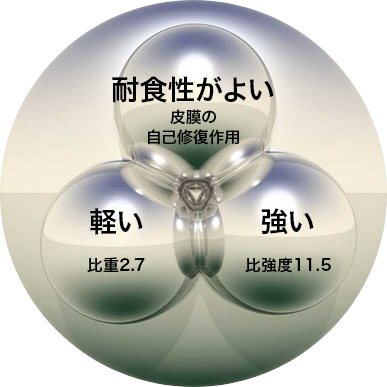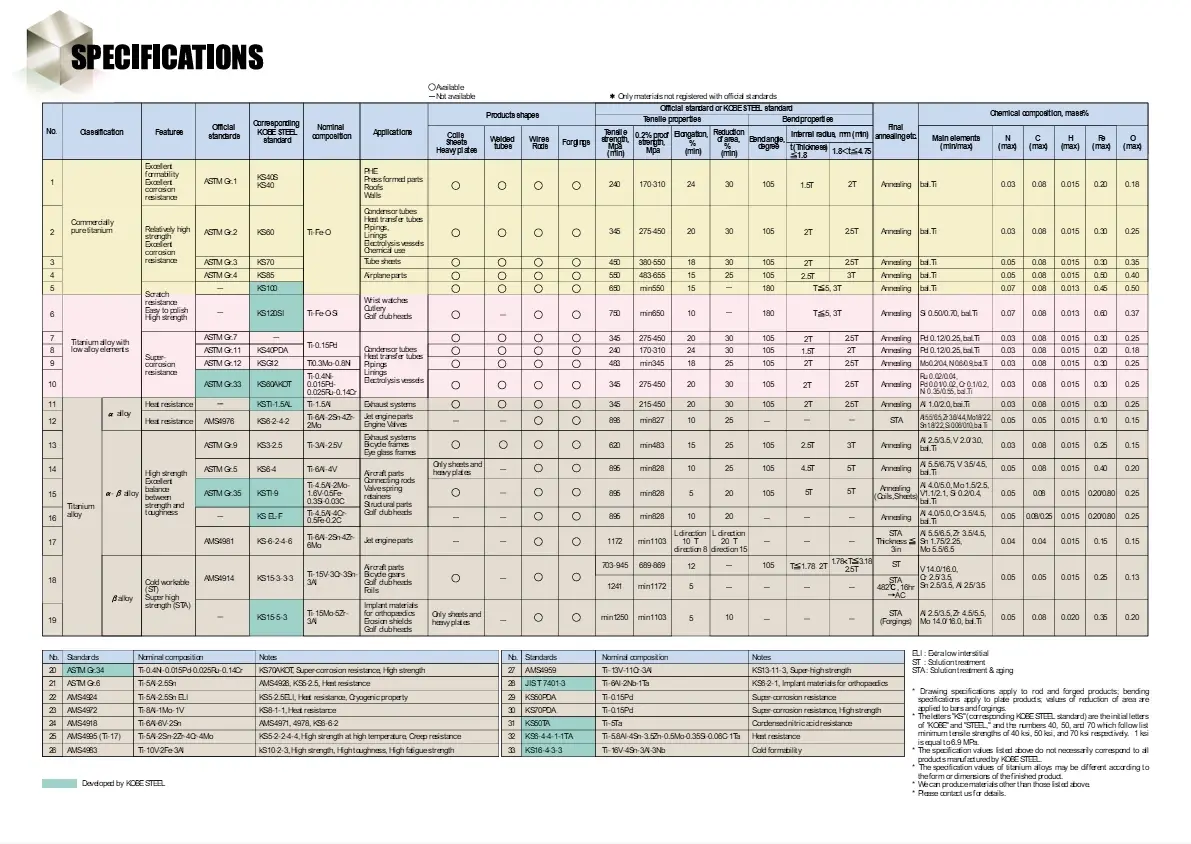Characteristics of Titanium

Highest Specific Strength Among Structural Metals
Titanium is a remarkable metal known for being lightweight, strong, and highly resistant to rusting—even under seawater.
Its density is about half that of iron, yet its strength is comparable to steel.
Titanium also offers excellent corrosion resistance, demonstrating complete resistance to seawater. It is non-toxic and safe for use in the human body.
Titanium is not significantly affected by welding, machining, heat treatment, or aging over time. It is also easy to recycle, making it an environmentally friendly metal.
This section offers a detailed look at the characteristics of titanium.
Lightweight, Strong, Rust-Resistant
| Property | Description | Typical Applications |
|---|---|---|
| Excellent corrosion resistance | Completely resistant to seawater | Heat exchangers, building materials |
| Lightweight | Approximately 60% lighter than stainless steel | Aircraft engines |
| High strength | Tensile strength of 275–735 MPa for commercially pure titanium, 620–1,800 MPa for titanium alloys | |
| High elasticity | Elastic modulus is about 50% that of stainless steel | Golf club heads, springs |
| Excellent low-temperature toughness | Commercially pure titanium and titanium alloys are both ductile at extremely low temperatures | Liquid oxygen tanks |
Safety
| Property | Description | Typical Applications |
|---|---|---|
| Excellent biocompatibility | Low ion elution when used in human bodies Low toxicity |
Artificial bones, dental implants, heart valves |
| Skin-friendly | Strongly suppresses metal allergies | Watches, necklaces |
Heat Resistance
| Property | Description | Typical Applications |
|---|---|---|
| Low thermal conductivity | About 8% the thermal conductivity of aluminum; similar to stainless steel | Tooling for molten metal handling |
| Heats up quickly | About 60% the heat capacity of stainless steel | Pots, frying pans |
| Low thermal shrinkage | About 50% the thermal expansion rate of stainless steel | Building materials, semiconductor manufacturing equipment |
| Non-combustible | Certified as a non-combustible material (Certification No. NM-8596) | Building materials |
Aesthetic appeal
| Property | Description | Typical Applications |
|---|---|---|
| Premium appearance | Used in high-end cameras and computer cases | High-end camera and PC cases |
| High design versatility | Can be colored through anodizing | Monuments |
Other Properties
| Property | Description | Typical Applications |
|---|---|---|
| High electrical resistance | About 30 times higher than copper; good for resistance welding | Seam welding for roofing materials, etc. |
| Very low magnetism | Magnetic permeability 1.00005 | Electronic devices (steppers, etc.) |
| Superconductivity | Achieved in Ti-Nb-based alloys | Superconducting generators, maglev trains |
| Hydrogen storage | Achieved in Ti-Fe-based alloys | Hydrogen gas supply systems |
| Short radioactive half-life | Shorter than iron, nickel, or chromium | Radioactive waste containment/disposal containers |
Production Range and Product Standards
Contact Us
You can reach us by clicking the inquiry button.

